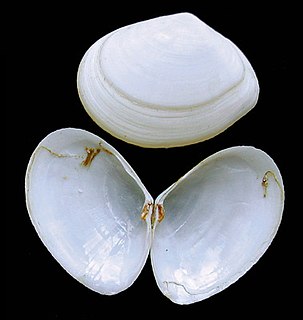
The blue mussel, also known as the common mussel, is a medium-sized edible marine bivalve mollusc in the family Mytilidae, the mussels. Blue mussels are subject to commercial use and intensive aquaculture.
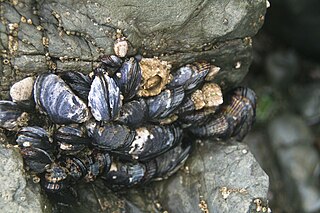
The California mussel is a large edible mussel, a marine bivalve mollusk in the family Mytilidae.
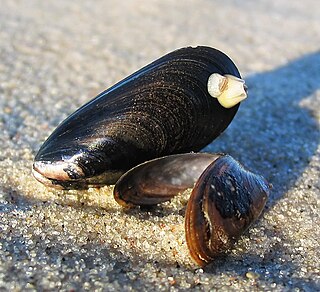
The Mytilidae are a family of small to large saltwater mussels, marine bivalve mollusks in the order Mytiloida. One of the genera, Limnoperna, inhabits brackish or freshwater environments. The order has only this one family which contains some 52 genera.

Perna perna is an economically important mussel, a bivalve mollusc belonging to the family Mytilidae. It is harvested as a food source but is also known to harbor toxins and cause damage to marine structures. It is native to the waters of Africa, Europe, and South America and was introduced in the waters of North America.
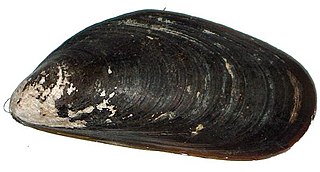
The Chilean mussel or Chilean blue mussel is a species of blue mussel native to the coasts of Chile, Argentina, Uruguay, the Falkland Islands and the Kerguelen islands. In the scientific literature, it has also been referred to as Southern Mytilus edulis, or Mytilus edulis platensis, or Mytilus chilensis.
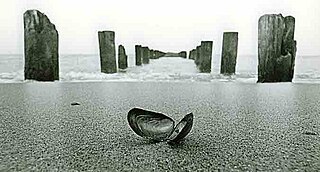
Mytilus trossulus, the bay mussel or foolish mussel, is a medium-sized edible marine bivalve mollusc in the family Mytilidae.
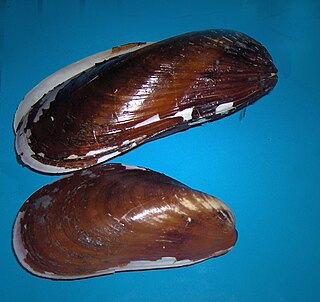
Modiolus modiolus, common name northern horsemussel, is a species of marine bivalve mollusk in the family Mytilidae.

Porgy is the common name in the US for any fish which belongs to the family Sparidae. They are also called bream. Porgies live in shallow temperate marine waters and are bottom-dwelling carnivores. Most species possess grinding, molar-like teeth. They are often good eating fish, particularly the gilt-head bream and the dentex.

The Mediterranean mussel is a species of bivalve, a marine mollusc in the family Mytilidae. It is an invasive species in many parts of the world, and also an object of aquaculture.

Nucella ostrina, the northern striped dogwinkle, is a species of sea snail, a marine gastropod mollusk in the family Muricidae, the murex snails or rock snails. Other common names for this mollusk include emarginate dogwinkle, short-spired purple dogwinkle, striped dogwinkle, ribbed dogwinkle, emarginate whelk, ribbed rock whelk, rock thais, short-spired purple snail and rock whelk.
Geukensia is a genus of marine bivalve mollusc in the Mytilidae family, naturally found in the western Atlantic.
Geukensia demissa is a species of mussel, a marine bivalve mollusk in the family Mytilidae, the true mussels. This species is native to the Atlantic coast of North America. The common names for this species include ribbed mussel, Atlantic ribbed marsh mussel and ribbed horsemussel. However, the common name ribbed mussel is also used for the Southern Hemisphere mussel Aulacomya atra. The appearance of the shell is grooved and oval in shape. The interior of this mussel is tinted purple

Ischadium recurvum, known as the "hooked mussel" or "bent mussel," is a species of bivalve mollusc in the family Mytilidae. It can be found along the Atlantic coast of North America, ranging from Cape Cod to the West Indies. They are often found growing on Eastern oysters, either intertidal or subtidal. They also attach to other hard substrates, including artificial reefs and dead shells of brackish water clams, Rangia cuneata.
Amygdalum papyrium, common name the Atlantic paper mussel, is a species of marine bivalve mollusc in the family Mytilidae, the true mussels. This species occurs along the Atlantic coast of North America, from Maryland to Florida, as well as in the Gulf of Mexico, from Texas to Mexico.
Aulacomya atra, called also the Magellan mussel or the ribbed mussel, is a southern species of edible saltwater mussel, a marine bivalve mollusk in the family Mytilidae, the true mussels. Note that the common name ribbed mussel is also used of the Northern Hemisphere mussel Geukensia demissa.
Trichomya is a monotypic genus of marine bivalve molluscs in the family Mytilidae, the mussels. The only species is Trichomya hirsuta which is endemic to southern and eastern Australia. Its common names include the hairy mussel, the greenling and the kelp greenling.

Eulalia viridis is a species of bright-green polychaete worm in the family Phyllodocidae. It can range from 5 to 15 cm in length and is usually found in shallow north Atlantic water under rocks or in mussel beds.

Modiolus barbatus, the bearded horse mussel, is a species of "horse mussel", a marine bivalve mollusc in the family Mytilidae, the mussels.




